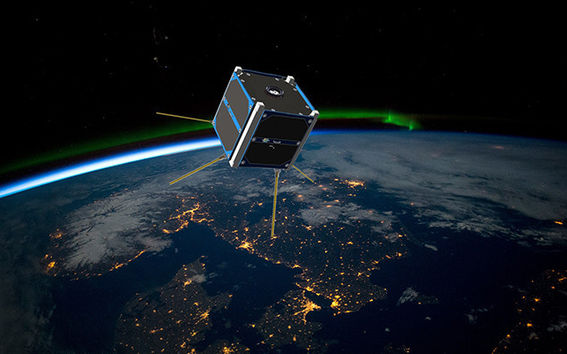Assembly of the Suomi 100 satellite has begun

Although this is undoubtedly the highest flying project of the centenary year, it also has an important scientific task: the satellite will be used to test new technology and to teach natural sciences.
The Suomi 100 satellite supports the research of Aalto University Professor Esa Kallio, who runs the project. His space weather research involves determining the location and behaviour of electrically charged solar wind particles from the Sun that have entered near the Earth. The specially manufactured radio receiver in the satellite will monitor the passage of radio signals through an ionosphere, the area around the Earth containing electrically charged particles. The resulting observations will provide additional information about the geospace, the space near the Earth, especially about properties of the Northern Lights.
The new 3D printed components used in the bearing structure can make it easier and less expensive to build nanosatellites in the future. The printed parts can also be lighter and more complex than components manufactured in the traditional manner. The technology is based on a method developed by Postdoctoral Researcher Antti Kestilä.
In addition, the satellite will take photos of our country and planet that will be available for all Finns to enjoy. The camera will also provide images of, for example, the Northern Lights to support the observations made by the radio measurement instrument.
The Suomi 100 satellite is the third nanosatellite built at Aalto University. Although smaller than the Aalto-1 satellite currently operating in space and Aalto-2, which was launched in the spring, it is still a proper satellite: similar, low-cost devices are used a lot for research and to test technology.
Learn more about satellites and space in the Space Truck
The Space Truck will be touring Finland in September-October 2017 as part of the Suomi 100 satellite project. The Space Truck is based on an exhibition concept that proved very popular in 2012 and 2014: a small space-themed science centre is built inside an exhibition truck. This time the exhibition will focus on presenting nanosatellites and the conditions in space. The truck also contains a small clean room where members of the general public can assemble a satellite.
The tour is bigger than ever, with 22 stops from southern Finland to Ivalo. The journey begins in Otaniemi on 15 September and ends with a special tour in Espoo on 17–20 October 2017. The majority of the truck’s content will be on display in the lower hall at the WeeGee Exhibition Centre from November 2017 until April 2018.
Finland celebrates this year it’s 100th anniversary of independence with multitude of projects ranging from local cultural events to launching a satellite. Aalto university participates also other centenary projects; more info about these is available here (http://www.aalto.fi/fi/current/suomifinland100/)
Further information:
www.facebook.com/suomi100satelliitti
Professor Esa Kallio
Tel. +358 50 420 5857
esa.kallio@aalto.fi
Postdoctoral Researcher Antti Kestilä
Tel. +358 45 131 0609
antti.kestila@aalto.fi
Space Truck producer Jari Mäkinen
Tel. +358 40 550 9198
jari.makinen@kupla.com
Read more news

Nature of Process: Exhibition by the students of the ‘Personal Exploration’ Course
Nature of Process is a multi-material exhibition of 14 Master´s students of Aalto ARTS
Doc+ connects research impact with career direction
Doc+ panels have brought together wide audiences in February to discuss doctoral careers and their diversity.
Apply Now: Unite! Visiting Professorships at TU Graz
TU Graz, Austria, invites experienced postdoctoral researchers to apply for two fully funded visiting professorships. The deadline for expressions of interest is 20 February 2026, and the positions will begin on 1 October 2026.






